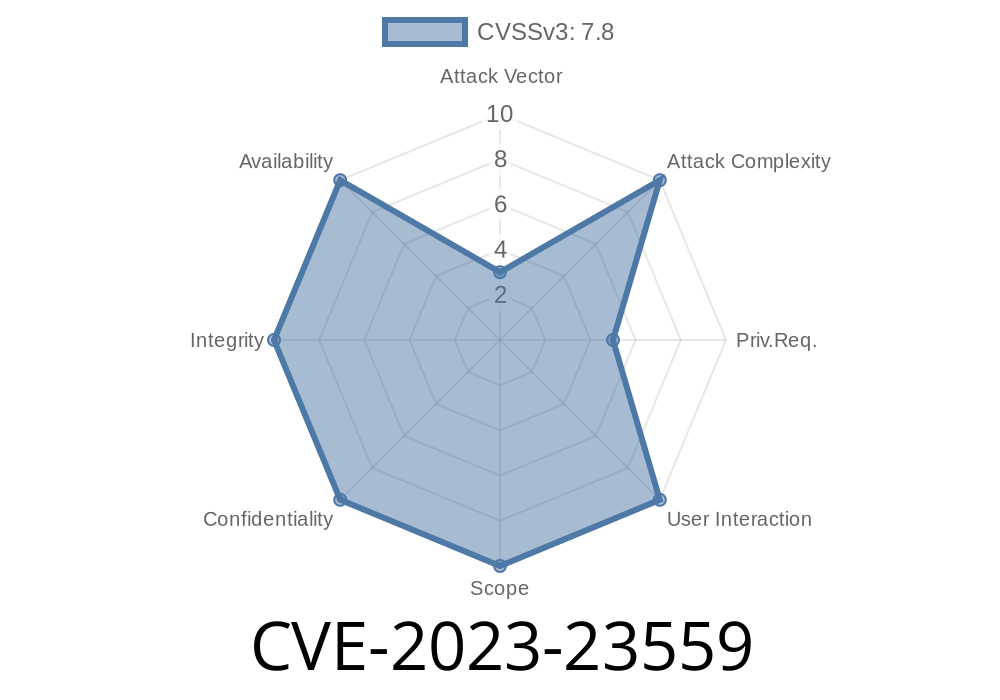In early 2023, security researchers uncovered a critical vulnerability—CVE-2023-23559—in the Linux kernel’s handling of wireless networking, specifically within the Remote Network Driver Interface Specification (RNDIS) implementation. This vulnerability affects Linux kernel versions up to 6.1.5 and could allow attackers to exploit systems using certain wireless chipsets.
This post breaks down how the bug occurs, why it’s dangerous, code snippets to help you see it, and references for deeper research. We’ll finish with a sample exploit concept to illustrate the risk.
The Vulnerability: Integer Overflow in rndis_query_oid
The root of CVE-2023-23559 lies in drivers/net/wireless/rndis_wlan.c, in the function rndis_query_oid. This function processes information requests (OID queries) from the RNDIS protocol, often coming from USB dongles or certain wireless chips.
The problem: an unsafe addition leads to an integer overflow, which can open the door to memory corruption and further attacks.
Here is a simplified example of the vulnerable code
static int rndis_query_oid(struct net_device *dev, rndis_req *req, u32 oid, void *buf, u32 buflen)
{
...
/* Vulnerable calculation (simplified) */
u32 total_len = sizeof(struct rndis_query_msg_type) + buflen + off;
...
/* Memory allocation using total_len */
msg = kzalloc(total_len, GFP_KERNEL);
// No check for integer overflow on total_len!
...
}
If an attacker can control buflen (directly or indirectly), supplying a large value (for example, close to UINT_MAX), the addition can wrap back to a small value, causing kzalloc to under-allocate memory. Later, when more data is written than was allocated, this leads to buffer overflows—potentially allowing code execution in kernel space.
Why Is This So Dangerous?
- Kernel Space Exploit: An attacker controlling kernel memory can escape isolation, cause DoS, or execute code with highest privileges.
- Remote Exploitability: Since RNDIS is widely used for wireless network connectivity over USB and other interfaces, any device plugged in—like a compromised wireless dongle or USB stick—could become the vector.
- Wide Impact: Many consumer-grade and embedded devices use these kernel versions or older and may take time to patch.
To take advantage of this bug, an attacker has to
1. Control buflen Value: This may be possible by sending custom-crafted OID requests over the RNDIS protocol.
2. Overflow the Addition: Pass a buflen value so large that it causes the sum to wrap around to a smaller value:
- For example, if sizeof(struct rndis_query_msg_type) is 36, and off is 8, then giving a buflen of (UINT_MAX - 36 - 8 + 1) makes total_len wrap to zero.
3. Trigger Under-Allocation and Overflow: With a small buffer returned by kzalloc, the subsequent code ends up writing more data than allocated memory, corrupting kernel memory.
4. Gain Privileges or Crash System: Depending on heap layout and possible further primitives, this can lead to code execution or system crash.
Sample Exploit Concept
>Note: The actual exploit may require additional steps, such as kernel address discovery or elaborate heap spraying, but here is a minimal demonstration idea.
// Pseudocode for exploit illustration
#define MAX_U32 xFFFFFFFF
unsigned long buflen = MAX_U32 - sizeof(struct rndis_query_msg_type) - off + 1;
send_rndis_query_oid(dev, req, custom_oid, controlled_buffer, buflen);
// ... buffer overflows, possibly landing shellcode or disrupting the kernel
A compromised device or a malicious actor physically connecting to the system (USB) could exploit this easily.
The Fix
Developers fixed this bug by adding sanity checks before the allocation—making sure the sum does not overflow:
// Patched version
if (buflen > UINT_MAX - sizeof(struct rndis_query_msg_type) - off) {
// reject/return error
return -EINVAL;
}
u32 total_len = sizeof(struct rndis_query_msg_type) + buflen + off;
msg = kzalloc(total_len, GFP_KERNEL);
With this check, any request that would cause overflow is safely rejected.
Official References and Further Reading
- CVE-2023-23559 on NVD
- Linux Kernel Patch
- oss-security mailing list report
- rndis_wlan.c in mainline
Conclusion
CVE-2023-23559 is a classic example of how simple arithmetic errors can lead to dangerous vulnerabilities in kernel code. If you manage Linux systems—especially with wireless networking support—be sure to patch, restrict USB exposure, and watch for updates. Stay safe and vigilant!
*This post is exclusive and written for educational purposes. Share, patch, and protect your systems!*
Timeline
Published on: 01/13/2023 01:15:00 UTC
Last modified on: 03/02/2023 16:15:00 UTC
